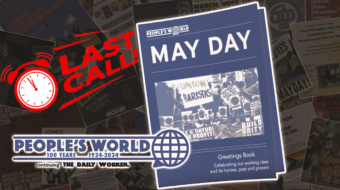
The latest media coverage of Puerto Rico focuses on unpayable debt while steering clear of the island’s colonial status. Yet an off-and-on independence struggle has continued there for at least 150 years. A tipping point came in 1950 when Nationalists launched an armed rebellion. It failed, and independence agitation has lagged ever since, weakened by the population’s growing economic distress and dependency, swelling emigration to the United States, and the specter of repression.
Nelson A. Denis’ new book, “War Against All Puerto Ricans: Revolution and Terror in America’s Colony,” lays bare the colonial nature of U.S.-Puerto Rican relations. He does so by looking not at earlier colonial history or U.S. legislation and decrees, but rather measures taken to subdue Nationalists before and after their uprising. The book’s title testifies to that slant. Island police chief E. Francis Riggs spoke those words appearing there in 1935. He was passing off recent police murders in Río Piedras as what happens in war.
Writing as more storyteller than historian, Denis portrays horrific oppression and obsessed, flamboyant, and even bizarre personalities. Vivid language and efficient organization of material add a real-time dimension to his narrative. The book has the potential to promote awareness among North Americans who don’t associate Puerto Rico with theft or owning. And it may spur U.S. anti-imperialists who read the book to remember a U.S. colonial holding near at hand.
Denis’ father and mother were natives of Cuba and Puerto Rico, respectively. His family was living in New York in 1962 when the FBI abruptly took away his father, who was deported. He was eight years old and never saw his father again. Denis says this made him become a lawyer. For 40 years he talked with Puerto Rican independence activists to learn about their struggles and about the Nationalists in particular. He eventually gained access to mountains of U.S. intelligence files on Puerto Rico.
Much of the book is about Pedro Albizu Campos, president of Puerto Rico’s Nationalist Party from 1930 on. For the author, “the story of Albizu Campos is the story of Puerto Rico. It is also the story of empire.” He casts Albizu as both heroic and tragic. Orphaned and poor, Albizu was the first Puerto Rican to attend Harvard College and was valedictorian of his law school class there. He spent 25 years in prison and dedicated his life to Puerto Rican independence. The book presents convincing evidence that radiation torture in prison hastened his death in 1965.
Mounting agitation by the Nationalists provoked increasing repression on the part of Puerto Rico’s militarized police, the FBI, and U.S. Army. The climax occurred in October 1950 when the Nationalists launched armed assaults against symbols of authority.
Sugar cane production dominated the island economy in the 1930s; four U.S. companies owned half the arable land. Albizu led an island-wide strike of sugar workers in 1934. Population surveillance, intelligence gathering, disruption of rallies, and police violence intensified. Massacres, assassinations, and disappearances ensued. Federal authorities imprisoned Albizu in the United States in 1937. The charge was conspiracy to overthrow the U.S. government.
He returned in 1947 to an expanding U.S. military presence, economic distress, and a climate of fear. Nationalist Party recruitment was down. The island police, FBI, and Army intelligence shared secret police dossiers on 100,000 Puerto Ricans. Some 75,000 were under surveillance. A “gag law” criminalized even possession of a Puerto Rican flag.
Albizu declared in June 1948 that “For the past fifty years, the United States has been at war with Puerto Rico. They steal our land, sterilize our women, inject us with cancer and tuberculosis, they find traitors to rule over us, parasites who live by robbing their own people.” He announced in July 1948 that “Our country is past speeches. Puerto Ricans have to fight for their liberty with all arms at their disposal.”
Denis reports that informers had already alerted the police and army to rebel plans when the revolt began on October 28, 1950. Thousands of U.S. troops descended on cities. Fighter planes bombed Jayuya and Utuado. Nationalists on a suicide mission struck at the governor’s residence. Two Nationalists were killed trying to murder President Truman in Washington. Truman had offended by dismissing the rebellion as an “incident between Puerto Ricans.” Except for a six-month release in 1953 prompted by international pressure, Albizu would spend the rest of his life in La Princesa prison.
The author offers no optimism as to eventual national independence. Yet long ago Cubans preparing for war against Spain did envision a parallel Puerto Rican evolution toward independence. Members of Jose Martí’s Cuban Revolutionary Party even devised Puerto Rico’s flag. Why did the two paths diverge?
Cubans had already fielded two armies in two independence wars in 1898 when the United States was taking over remnants of Spain’s colonial empire. They had fought for social justice and independence and defeated Spain’s army. That record promised no good for U.S. aspirations to own Cuba, but circumstances in Puerto Rico at the time must have been more encouraging.
Nelson A. Denis was the editorial director of El Diario/La Prensa, the largest Spanish-language newspaper in NYC, where he published over 300 editorials and won the Best Editorial Writing award from the National Association of Hispanic Journalists.
A graduate of Harvard University and Yale Law School, Denis served as a New York State Assemblyman (1997-2001). He has written for the New York Daily News, Newsday, the New York Sun, and Harvard Political Review.
Denis’s screenplays have won awards from the New York State Council on the Arts (NYSCA), the New York Foundation for the Arts (NYFA), and CineFestival. He also wrote and directed the feature film VOTE FOR ME!, which premiered in the Tribeca Film Festival.
War Against All Puerto Ricans: Revolution and Terror in America’s Colony
by Nelson A. Denis
Nation Books, New York, 2015
Available in Kindle, Hardcover and paperback editions












Comments